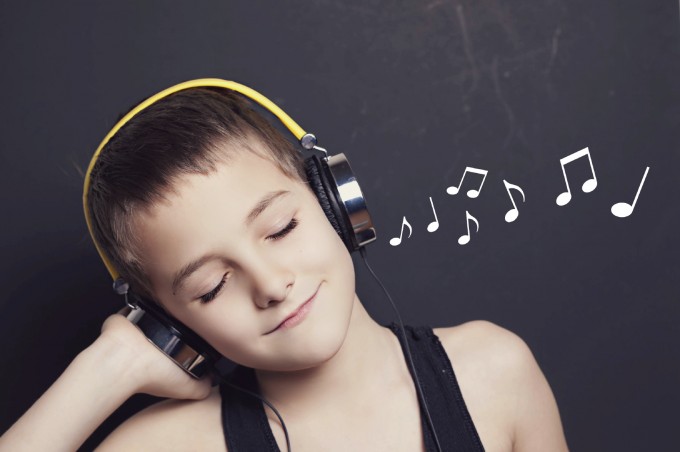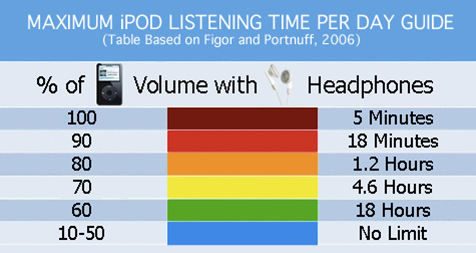Kids Plugged In: What’s Too Loud?
Gayle Flood is a licensed Audiologist in the Speech-Language-Hearing department at Franciscan Hospital for Children. If you have hearing-related questions, please email us at info@fhfc.org or call (617) 254-3800, ext. 5110.

Have you tried to talk to your children while driving in the car, or to get your child’s attention only to realize they’re not hearing you? Instead they’re plugged in, earbuds in, and tuned into something else.
Whether it’s an iPhone, an iTouch, a portable tablet or other device – about ninety percent of 12-19 year olds use personal music players with earbuds. Regardless of device or brand, high volume output through earbuds can have negative impacts on children’s hearing.
Did you know that 12.5% of 6-19 year olds (6.8 million), and 16.8% of 12-19 year olds (5 million), in the United States have permanent damage to their hearing from excessive exposure to noise*? An MP3 player at 70% of its top volume is about 85 decibels. For comparison, an idling bulldozer is at 85 dB, and it can cause permanent damage after only 1 work day (8 hours).
How do I know if my child’s MP3 device is too loud?
Some parents find it difficult to identify what is or is not a dangerous noise level, especially when they’re not the one with the headphones in. Below are a couple of benchmarks to help:
- Stand one arm’s length away from your child while they have their headphones in. Try having a conversation. Does your child have to remove one or both of their earbuds to hear you? If yes, the music is probably too loud.
- Consider your surroundings, and the distance you are away from your child while they have their headphones in. Whether you’re across the room or driving while they’re in the back seat, can you hear their music? If yes, the music is probably too loud.
Hearing loss can have unwanted social impacts on a child’s relationships with their peers, as well as behavioral effects in the classroom and at home. Hearing loss can be caused by different things, ranging from genetics to ear infections, even prolonged exposure to loud noise from recreational sounds.
Noise induced hearing loss due to earbuds is 100% preventable, if you use them in moderation.
How can I control the volume?
As many parents know, trying to control the volume in your child’s earbuds can be a losing battle. It can be difficult to convince them that louder isn’t necessarily better, but there are a few ways to control the blare:
- Use volume control. Many mp3 and other devices contain volume limit functions that enable you to set a maximum volume for your device, use it as a control or benchmark to help establish safe listening levels.
- Choose headphones instead of earbuds. Earbuds fit tighter and deeper into the ear canals, thus increasing the volume levels at the level of the ear drum. Stock earbuds that come with iPods are on average 6 decibles louder that the over-the-ear style headphones. Headphones with volume limiting, keeps the sound down below 85 decibels, which is recommended for as safer for younger ears.
- Implement the 60% Rule. Listen to music or play video games at no more than 60% of the maximum volume.
- Set a time limit. Limit the amount of time that you spend with earbuds in your ears to 60 minutes.
- Try safe-listening earphones. ETY•Kids safe-listening earphones are engineered for safe sound output while maintaining sound quality. By controlling earphone sensitivity, it is not necessary to restrict the volume setting on the player. Sound heard through ETY•Kids earphones will not exceed safe levels, so parents can rest easy. Even at the maximum volume setting on portable players, kids can listen safely for up to four hours per day.
- Educate. Talk to your kids and be open about why you’re asking them to turn it down, and educate them about the dangers of high volume levels and why it’s important to protect their hearing.
Always be aware of those moments when your child doesn’t seem to hear you. It’s easy to assume they’re simply doing their best to ignore you, but it could be a bigger issue related to hearing loss. If you have any concerns regarding your child’s hearing, contact their pediatrician and seek a hearing evaluation by a licensed audiologist.
*National Institute on Deafness and Other Communication Disorders
View All Blog Stories